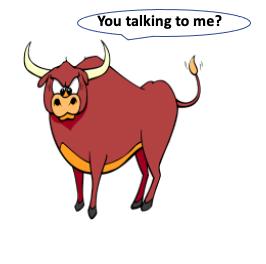Melatonin has been in the news recently because of potential safety concerns in children, possible weight gain, and as a potential treatment for Covid.
Its use is largely unregulated because it is considered to be a dietary supplement or food thanks to the bewildering and nonsensical Dietary Supplement Health and Education Act of 1994. DSHEA allows certain drugs to be treated as if they weren't drugs, something that Dr. Henry Miller and I wrote about in 2019.
In the Bizzaro World of dietary supplements, anything goes, except science. So, it is not at all surprising that melatonin, a hormone produced in the pineal gland in the brain, is sold using, let's just say, unorthodox marketing methods. Or a bunch of lies. You pick. Here are a few beauties.
An "Herbal" Supplement

Fruily Organic makes herbal melatonin gummies and they are delicious (Organic Apple, Peach & Mango!). Well, they may be tasty, but I doubt they're herbal. Why? Table 1.
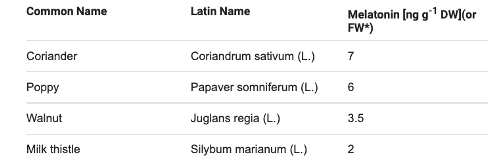
Table 1. Melatonin content in several herbs. Source: Cells
If you think we have a supply chain problem on our hands now just try to fill the shelves of CVS with melatonin made from milk thistle. The herb contains 2 nanograms of melatonin per gram of dry-weight milk thistle, or 0.000000002% of the mass (I can virtually guarantee this number is wrong. Go ahead, wise asses. Be the first to correct my horrendous math.) Let's say you can isolate every bit of the melatonin from the herb. It would take 50 million grams (11 million pounds) of the stuff to make one Costco-size bottle. No, the damn things are not herbal; they're synthetic (more on that later).
A Non-Drug Drug
Natrol is a well-known name in the world of supplements. They sell melatonin too! The problem? It's supposed to be "drug-free."

Except, it's not.
The FDA defines a drug, in part, as “intended for use in the diagnosis, cure, mitigation, treatment, or prevention of disease” and “articles (other than food) intended to affect the structure or any function of the body of man or other animals.”
Source: FDA, Importing Human Drugs
Hmm. It's not a food. It mitigates, treats, and prevents insomnia. This makes it a ####ing drug, the label notwithstanding (1).
These obvious contradictions are "mitigated" by language doublespeak required on all supplement bottles. But it's not so easy to read unless you're Superman. Oversight? Sleazeball marketing? You decide:
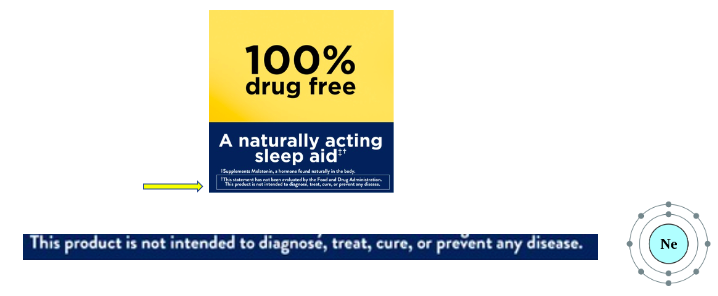
A typical supplement label. Note that the disclaimer (yellow arrow) is roughly the size of a neon atom. Image: Wikimedia Commons.
Cruelty-Free and Safer Than Natural
Here's an interesting product from Life Choice.
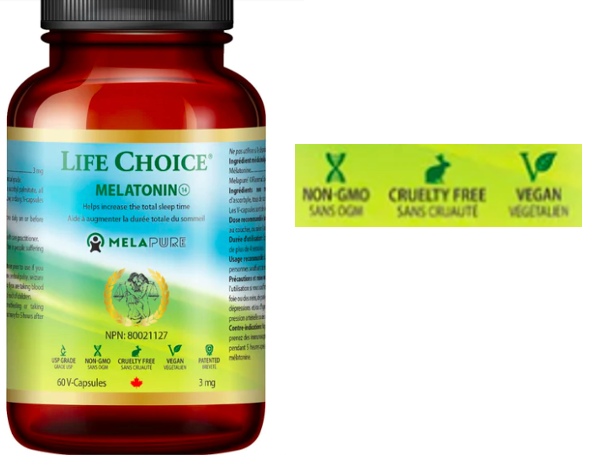
The Life Choice label is as green as St. Patrick's Day, so it's obviously natural, right?
Wrong. The company claims (and this is actually true) that its product is superior because it's synthetic. Huh? Life Choice's claim is correct but their chemistry is a little shaky, for example:
"Two forms of melatonin exist in the general market. One is the natural form which comes from the pineal gland of animals. It can be mixed with unknown synthetic material or unknown synthetic material free from animal tissues."
Wrong. Melatonin is melatonin, no matter where it comes from. What they mean is purity – depending on the source there may be impurities (technical term: ickies) found in one and not the other. In this case, I'll take the synthetic product any day (or night, really). Why?
Melatonin is a pineal hormone and its natural source is the brain's pineal gland. The increasing frequency of "mad cow disease" points to a potential danger if bovine pineals were really the source of melatonin in health food preparations.
Source: Journal of AOAC INTERNATIONAL
Well, that's just swell. By all means, let's buy a hormone, perhaps from a pissed-off cow, and hand it out like candy at a dose that is either too high, too low, or (if you're lucky) just right.
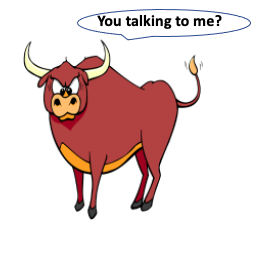
"Cruelty-free?" I'll say. It's pretty difficult to be cruel to the bag of chemicals used in the synthesis of melatonin. Same with GMO-free. Yes, chemicals are GMO-free because they lack the "O" – organism. This is a bit like advertising that a toaster is GMO-free.
Original Image: Public Domain Vectors
Such an easy article to write. The world of dietary supplements continues to provide an endless supply of fodder.
Sleep well.
NOTES:
(1) These contradictions are permissible because under DSHEA all supplements must contain the following disclaimer:
(2) There are a number of methods used in the industrial synthesis of melatonin, the first described in 1956 (using the good old Fischer Indole Synthesis, a reaction discovered in 1883).
